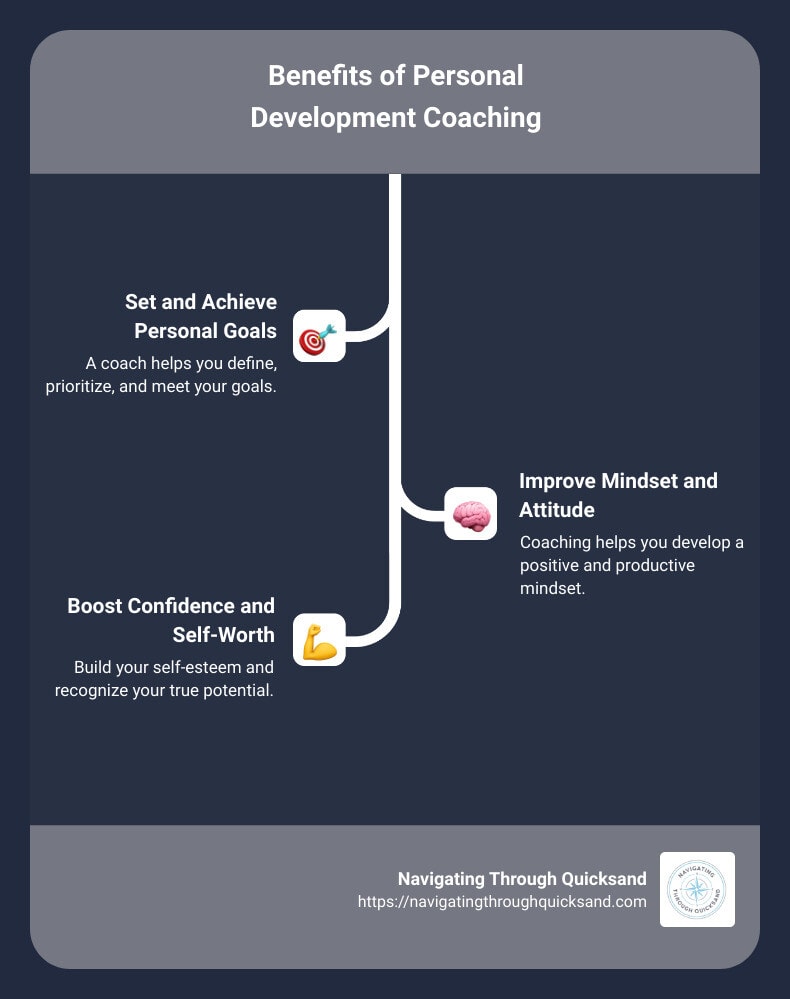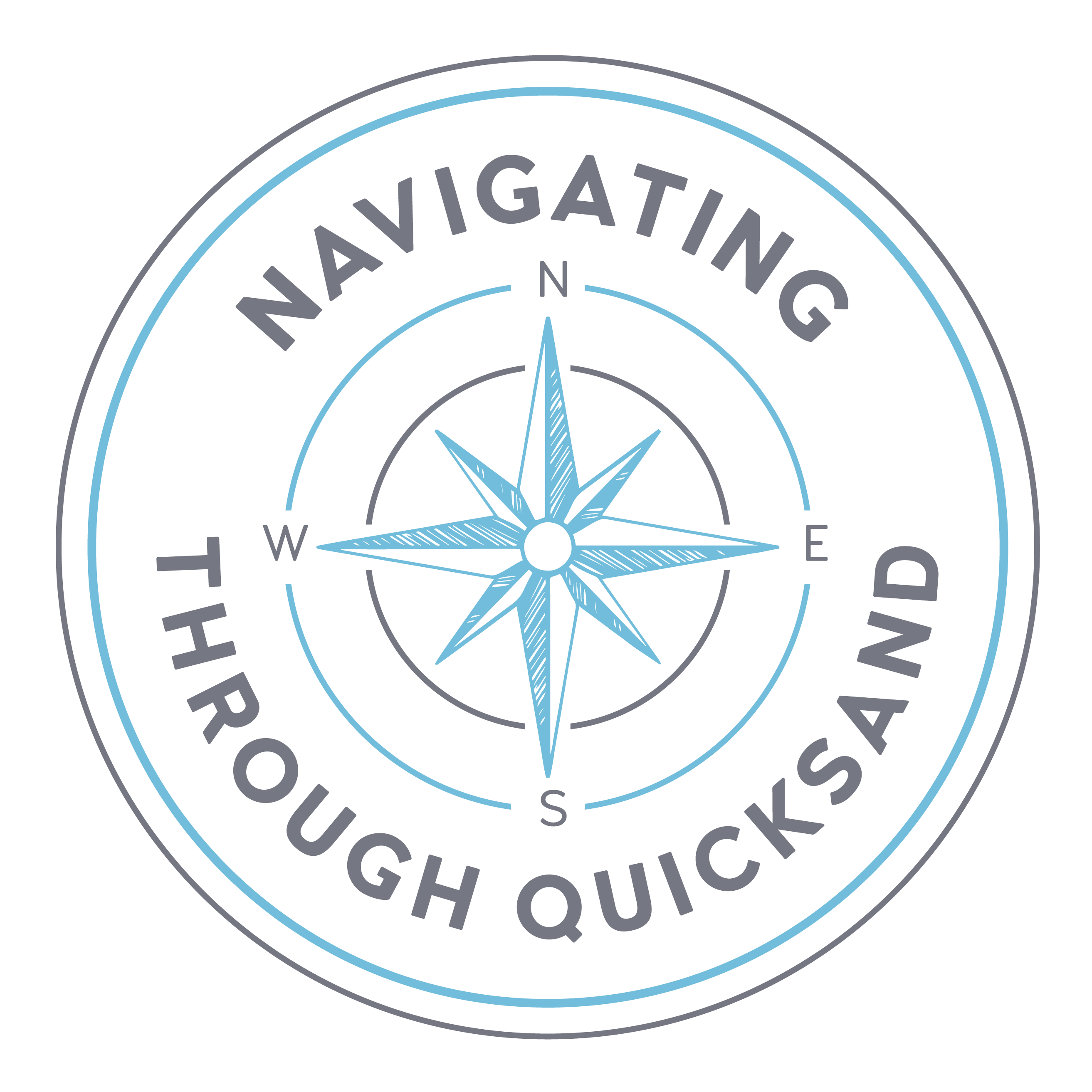Releasing Your Potential: The Role of Personal Development Coaches
Whether you’re feeling stuck in your career, overwhelmed by life’s challenges, or simply striving for self-improvement, understanding what a personal development coach is can be incredibly helpful.
A personal development coach helps individuals improve their self-esteem, well-being, and relationships by offering guidance, support, and accountability.
Personal Development Coaching Benefits:
- Self-Awareness: Gain a deeper understanding of your strengths and areas for improvement.
- Confidence: Build the self-confidence needed to tackle any challenge.
- Resilience: Learn to bounce back from setbacks and adapt to new situations.
- Emotional Well-Being: Improve your mental health and emotional stability.
- Skill-Building: Develop new skills that can improve both your personal and professional life.
- Relationship Improvement: Strengthen your personal and professional relationships.
Personal growth is a journey that requires intention and commitment, and a personal development coach can make all the difference. Mark Samuel, an expert in change, sums it up well:
“As human beings, we are always changing, growing, learning, having insights, and becoming more fleshed-out, authentic versions of ourselves. This is personal development, and while it can be intentional, it’ll usually happen regardless. But it’s to our benefit to make it intentional, and it’s to the benefit of our businesses as well.”
So, if you’re looking to open up your true potential, a certified personal development coach could be the key.

Table of Contents
What is a Personal Development Coach?
A personal development coach works with clients to help them identify, pursue, and achieve their goals through various methods, including goal-setting, active listening, behavioral change, and more. The coaching process is crucial in personal development coaching as it guides clients in unlocking their potential, setting specific goals, taking action, and staying committed to self-improvement.
Personal development coaching is designed to help clients improve key elements of personal growth, like self-awareness, confidence, upskilling, communication, and positive thinking.
Key Responsibilities
A personal development coach operates as a trusted guide and mentor, committed to facilitating an individual’s journey of self-improvement and personal growth. Most personal development coaches do not require certifications but focus on practical know-how and methodology. Here are some key responsibilities:
- Guidance: Coaches help clients steer their personal growth journey by offering expert advice and insights.
- Support: They provide emotional and motivational support, ensuring clients stay committed to their goals.
- Accountability: Coaches hold clients accountable for their progress, helping them stay on track.
- Personalized Strategies: They create custom strategies based on the client’s specific needs and goals.
- Self-Improvement: Coaches focus on various aspects of personal development, such as boosting self-confidence, enhancing interpersonal skills, managing stress, and advancing careers.
Common Coaching Methods
Personal development coaches use a variety of methods to help their clients achieve their goals. Here are some of the most common:
- Goal-Setting: This involves identifying specific, achievable goals and creating a roadmap to reach them. Coaches help clients break down larger goals into manageable steps.
- Active Listening: Coaches listen attentively to understand their clients’ needs, concerns, and aspirations. This helps in building a strong rapport and trust.
- Behavioral Change: Coaches work with clients to identify and change behaviors that are hindering their progress. This may involve developing new habits or altering existing ones.
- Feedback: Providing constructive feedback is crucial. Coaches offer insights and perspectives that help clients see their progress and areas for improvement.
There is a growing demand for personal coaching, and becoming a successful personal development coach involves understanding the industry, including online courses, workshops, and starting a personal coaching business for more flexibility and freedom.
By employing these methods, personal development coaches empower their clients to realize their full potential and lead fulfilling, meaningful lives.
Self-Awareness and Confidence
Self-awareness is a cornerstone of personal development. Coaches help clients understand their strengths, weaknesses, and areas for growth. This self-awareness builds confidence, enabling clients to tackle challenges head-on.
Upskilling and Communication
Coaches also focus on upskilling—helping clients acquire new skills or improve existing ones. Effective communication is often a key area of focus, as it impacts both personal and professional relationships.
Positive Thinking
Positive thinking is another critical area. Coaches encourage clients to adopt a positive mindset, which can lead to improved mental well-being and overall life satisfaction.
Next up, we’ll dive into the benefits of hiring a personal development coach and how they can transform both individual lives and organizations.
Benefits of Hiring a Personal Development Coach

For Individuals
Self-Awareness
Personal development coaches help individuals become more self-aware. This means understanding your strengths, weaknesses, and what truly drives you. Increased self-awareness can lead to better decision-making and a more fulfilling life.
Confidence
A coach can help build your self-confidence. According to a 2009 ICF Global Coaching Study, 80% of coaching clients reported improved self-esteem or self-confidence. This newfound confidence can open doors you never thought possible.
Resilience
Life throws challenges at us all the time. A personal development coach can teach you how to bounce back from setbacks. You’ll learn to view failures as opportunities for growth, making you more resilient.
Emotional Well-Being
Managing emotions is crucial for a balanced life. Coaches provide tools to improve your emotional well-being, such as stress management techniques and positive thinking strategies.
Skill-Building
Whether it’s better communication or time management, coaches help you develop essential skills. These skills can improve both your personal and professional life. Additionally, the potential personal development coach salary can be quite rewarding, especially as your expertise grows and you understand the value of coaching.
Relationship Improvement
Coaches also focus on improving your relationships. You’ll learn how to communicate better and resolve conflicts, leading to more harmonious personal and professional relationships.
Habit Adoption
Want to adopt new, healthier habits? A coach can help you set and achieve these goals. Whether it’s exercising regularly or eating healthier, you’ll get the support you need to make lasting changes.
Goal Achievement
Coaches help you set specific, achievable goals. With their guidance, you’ll create a plan and take actionable steps to reach those goals. This structured approach makes it easier to achieve what you set out to do.
Self-Worth
Feeling good about yourself is essential. Coaches help you build self-worth by recognizing your achievements and strengths. This positive reinforcement can significantly boost your overall happiness.
Lifestyle Improvement
Whether you want a better work-life balance or a healthier lifestyle, a coach can guide you. They provide personalized strategies to help you live the life you want.
For Organizations
Employee Support
Organizations can benefit greatly from offering coaching to their employees. Coaching provides employees with the tools they need to manage stress, improve performance, and achieve their professional goals.
Leadership Development
Coaching is invaluable for leadership development. Leaders who undergo coaching become more self-aware, better communicators, and more effective in their roles. This leads to a more cohesive and productive team.
Manager Coaching
Managers also benefit from coaching. They learn how to support their teams better, improve their decision-making skills, and manage their time more effectively. This leads to a more efficient and motivated workforce.
C-Suite Coaching
Even top executives can benefit from coaching. C-suite coaching focuses on strategic thinking, leadership skills, and personal development. This ensures that the organization’s leaders are well-equipped to guide the company toward its goals.
Next, we’ll explore the differences between a personal development coach and a life coach, so you can choose the right type of coaching for your needs.
Personal Development Coach vs Life Coach

Differences in Services
While both personal development coaches and life coaches aim to help people improve their lives, they do so in different ways.
A life coach takes a generalist approach. They work with clients on a wide range of issues, from career and relationships to health and finances. Life coaching covers many areas, but it often lacks a specific focus. For example, a life coach might help someone balance their work and personal life or set broader life goals.
In contrast, a personal development coach has a specific focus on personal growth and self-improvement. They help clients develop self-awareness, build confidence, and overcome personal challenges. This type of coaching is rooted in positive psychology and personal growth theories. For instance, a personal development coach might help someone build self-confidence to pursue a new career or develop better communication skills.
Similarities in Approach
Despite their differences, both types of coaches share some common approaches.
Goal-Setting
Both personal development coaches and life coaches emphasize goal-setting. They work with clients to identify their goals and create a plan to achieve them. For example, a coach might help a client set specific, measurable, achievable, relevant, and time-bound (SMART) goals.
Action Planning
Once goals are set, both coaches help clients develop action plans. These plans outline the steps needed to reach their goals. For example, if a client’s goal is to improve their public speaking skills, the action plan might include joining a speaking club and practicing regularly.
Accountability
Both types of coaches hold clients accountable for their progress. They check in regularly to ensure clients are taking the necessary steps to reach their goals. This accountability helps clients stay committed and motivated.
Self-Improvement
Both personal development coaches and life coaches focus on self-improvement. They help clients identify areas for growth and develop strategies for improvement. For example, a coach might help a client develop better time management skills or improve their emotional well-being.
Coaching Methodologies
Both types of coaches use similar coaching methodologies. They employ techniques like active listening, powerful questioning, and providing feedback. These methods help clients gain insights and make positive changes in their lives.
Client Support
Both personal development coaches and life coaches provide ongoing support to their clients. They offer guidance, encouragement, and resources to help clients succeed. This support is crucial for clients as they work towards their goals.
Goal Achievement
Both types of coaches aim to help clients achieve their goals. Whether it’s improving personal skills or making significant life changes, the end goal is always client success.
Now that we’ve covered the differences and similarities between personal development coaches and life coaches, let’s dive into how to become a personal development coach.
How to Become a Personal Development Coach
Certification Programs
Becoming a personal development coach starts with the right certification program. These programs provide valuable knowledge and skills to help you understand the intricacies of coaching. Here are a few notable options:
- Change Academy: Best for focusing on confidence and personal growth. This program emphasizes building self-esteem and personal empowerment.
- Coach Training Alliance: Ideal for those looking to focus on professional development. It offers training that helps you guide clients in their career paths and professional goals.
- Jay Shetty Certification School: Known for building a business. This program not only teaches coaching skills but also how to establish and grow your coaching practice.
- Udemy: The best budget option. This self-paced online course covers the basics of personal development coaching without breaking the bank.
Obtaining a personal development coaching certification from reputable organizations, such as the ICF, can be beneficial in demonstrating expertise and credibility.
Each of these programs varies in length, cost, and mode of delivery. For example, the Jay Shetty Certification Schooloffers a 120-hour course, while Udemy provides a self-paced course for $69.99. When choosing a program, consider factors like accreditation, course length, and cost.
Essential Skills
To be a successful personal development coach, you need more than just certification. Essential skills include:
- Active Listening: Truly hearing your clients is crucial. It helps you understand their needs and guide them effectively.
- Empathy: Being able to put yourself in your client’s shoes builds trust and rapport. Empathy allows you to connect on a deeper level.
- Problem-Solving: Clients come to you with challenges. Your ability to help them find solutions is key to their success.
- Providing Feedback: Constructive feedback helps clients grow. Learn to give feedback that is both honest and supportive.
- Rapport Building: Building a strong relationship with your clients is fundamental. It fosters a safe space for them to open up and work on their goals.
Business Acumen
Running a successful coaching business requires more than coaching skills. You need to understand the business side of things:
- Marketing: Knowing how to market your services will attract clients. Use online platforms, social media, and networking to get the word out.
- Client Management: Keeping track of client progress and managing appointments is essential. Use tools and software to stay organized.
- Financial Management: Understanding your finances ensures you can sustain your business. Keep track of expenses, income, and pricing strategies.
Common Personal Development Coaching Topics

Personal development coaching covers a wide array of topics. Here are some of the most common areas coaches focus on:
Mindset and Attitude Improvement
Many clients seek to shift their mindset to become more productive, positive, and happy. A coach can help you identify negative thought patterns and replace them with empowering beliefs. Mark Samuel, a change expert, emphasizes the importance of personal growth: “As human beings, we are always changing, growing, learning, having insights, and becoming more fleshed-out, authentic versions of ourselves.” When you change your mindset, you open the door to greater productivity and overall happiness.
Stress and Burnout Management
Stress is a major issue in today’s world. Coaches work with clients to identify key stressors and develop healthy coping mechanisms. By managing stress effectively, you can avoid burnout and maintain a balanced life. According to a study by BMC Health Services Research, life coaching can improve health outcomes for certain patients, underscoring the importance of stress management.
Relationship Management
Improving personal and professional relationships is another common coaching topic. Whether it’s enhancing communication with a spouse or building better rapport with colleagues, relationship management skills are crucial. Coaches help clients steer conflicts, improve communication, and foster more fulfilling relationships. This can lead to a more harmonious life both at home and at work.
Time Management and Productivity
Effective time management is essential for achieving personal and professional goals. Coaches assist clients in developing strategies for better prioritization and productivity. By learning to manage your time efficiently, you can accomplish more and reduce stress. This is especially valuable in a work setting, where productivity directly impacts performance and job satisfaction.
Career Development
Career development is a significant focus for many coaching clients. Whether you’re looking to explore new career opportunities, steer job transitions, or advance within your current company, a coach can provide valuable guidance. They help you set clear career goals, develop action plans, and stay motivated throughout the process. This targeted support can lead to significant advancements in your professional life. Professional development coaching focuses on reaching professional goals and involves clear expectations and agreements between the coach and the client.
By addressing these common topics, personal development coaches help clients transform various aspects of their lives, leading to greater fulfillment and success.
Tips for Success in Personal Development Coaching
Setting Specific Goals
Setting specific goals is the cornerstone of successful personal development coaching. Start by thinking deeply about what you really want. This is a chance to dream big.
Once you have a clear vision, work with your coach to document these goals. Writing them down makes them tangible and gives you a roadmap to follow.
Example: If you want to improve your communication skills, your goal might be to become a more effective listener in both personal and professional settings.
Taking Action
Goals alone won’t lead to progress. You need to take action. This means developing strategies and action plans with your coach to achieve your goals.
Behavioral changes are often necessary. For example, if your goal is to manage stress better, you might need to adopt new coping mechanisms like mindfulness or exercise.
Action plans break down your main goal into smaller, manageable steps. Each step should move you closer to your ultimate objective.
Example: For improving communication, you might start by practicing active listening techniques in everyday conversations.
Staying Committed
Success doesn’t happen overnight. Staying committed is crucial for long-term improvement. Personal development coaching is designed to be an ongoing process.
Ongoing support from your coach helps keep you accountable and motivated. Regular check-ins ensure you stay on track and adjust your strategies as needed.
Example: If you find yourself slipping back into old habits, your coach can help you identify the issue and develop new strategies to stay committed.
By following these tips—setting specific goals, taking action, and staying committed—you can maximize the benefits of personal development coaching and achieve lasting change.
Conclusion
Becoming a personal development coach involves a blend of certification, essential skills, and business acumen. Whether you’re drawn to programs like the Coach Training Alliance or the budget-friendly Udemy, the journey starts with the right training. There are various personal development coaching programs available, each offering unique benefits for self-improvement.
Personal development coaching offers numerous benefits, and with the right coach, you can achieve remarkable growth and sustained success. Thank you for joining us on this exploration of personal development coaching. We hope this guide has provided you with valuable insights and the motivation to pursue your own personal growth journey.
Whether you are an individual looking to adopt new habits or an organization aiming to support your employees, personal development coaching can make a significant impact. Our experienced coaches at Navigating Through Quicksand are ready to help you set and achieve your goals, providing the support and accountability you need to succeed.
Ready to take the first step towards a better you? Contact us today at Navigating Through Quicksand and start your journey today!
Frequently Asked Questions about Personal Development Coaches
What is the difference between a life coach and a personal development coach?
A life coach helps clients improve various aspects of their lives, like career, health, and relationships. They often pick a specialization, such as small business coaching or relationship coaching, to stand out.
A personal development coach focuses specifically on personal growth and self-improvement. This can include building self-awareness, boosting confidence, and developing strategies for positive change. While all personal development coaches are life coaches, not every life coach is a personal development coach.
Who needs a personal development coach?
Anyone looking to improve themselves can benefit from a personal development coach. This includes people who:
- Feel stuck in life
- Want to build confidence and resilience
- Seek better self-awareness
- Need help setting and achieving personal goals
- Want to develop positive habits
Example: In 2022, 37% of people turned to personal development when they felt stuck in life, according to SkyQuest.
How much does a personal development coach cost?
The cost of a personal development coach can vary widely. According to sources like Indeed and Salary.com, hourly rates can range from $11.42 to $122.79. Factors that influence the price include the coach’s experience, location, and the specific services offered.
Tip: When choosing a coach, consider their expertise and how well they match your personal development needs, not just the cost.
Next, let’s explore common personal development coaching topics to help you understand what areas you can work on with your coach.
Our Content
Our content is carefully created and edited by Ashley Gustafson to ensure that the content is accurate, reliable, and up-to-date. Navigating Through Quicksand, LLC is a trusted inspirational woman, inspirational speaker, and personal development coach in Massachusetts for confidence coaching programs, training sessions, athletic training for varsity teams, support for collegiate athletes, and more. Navigating Through Quicksand, LLC has empowered individuals with over 15 years of experience working with students and athletic teams from local communities.



